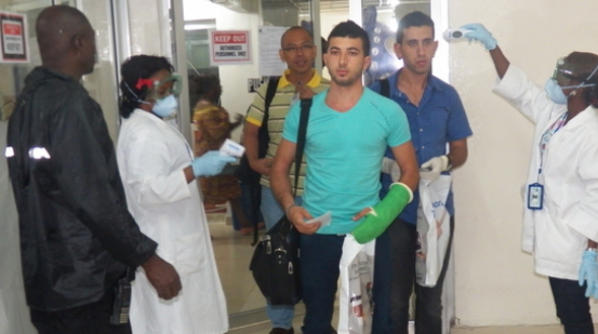
As the world cringes at the prospect of the Ebola epidemic in West Africa spreading rapidly to affect millions of people, the IMF has announced $130 million in emergency assistance to Guinea, Liberia and Sierra Leone to help combat the deadly disease.
In a release Friday, the fund said it’s Executive Board “in an expedited decision supported by a joint statement of all Directors” the financing will be made available to the three countries immediately, in the amounts of US$41 million for Guinea, US$49 million for Liberia and US$40 million for Sierra Leone.
On September 19, the World Health Organization (WHO) said that nearly six months after the first case of Ebola in west Africa was reported to the the body, the United Nations (UN) General Assembly and the Security Council have approved resolutions creating the United Nations Mission for Ebola Emergency Response (UNMEER) to contain the ongoing outbreak which has sickened more than 5,500 people and killed over 2,500.
“This is not just a public health crisis. This is a social crisis, a humanitarian crisis, an economic crisis and a threat to national security well beyond the outbreak zones,” said Dr Margaret Chan, WHO Director-General, to the UN Security Council on Thursday. “For these reasons, Mr Secretary-General and I are calling for a UN-wide initiative that draws together all the assets of all relevant UN agencies.”
“This unprecedented outbreak requires an unprecedented response,” said Dr David Nabarro, the UN Secretary General’s Senior Coordinator for the Ebola Response last week. “The number of cases have doubled in these countries in the last three weeks. To get in front off this, the response must be increased 20-fold from where it is today.”
The United States has initiated a response using its military and locally the governments involved are shutting down large swaths of their territory where the population is quarantined as estimates mount that as many as two million people could contract Ebola.
The IMF said this emergency financing comes in addition to the assistance provided under existing programs for these countries and will help cover part of the immediate balance of payments and fiscal needs currently estimated at about US$100 million for each country.
“The Ebola outbreak in Guinea, Liberia, and Sierra Leone has already cost too many lives,” said IMF Managing Director Christine Lagarde. “This humanitarian crisis could also have deep economic consequences. The governments of Guinea, Liberia and Sierra Leone requested IMF support to enhance their efforts to contain this unprecedented epidemic that is disproportionately affecting the most vulnerable in their populations.
“The IMF is working hard with the authorities of the affected countries and their development partners to ensure that the outbreak is quickly brought under control and to assist the economic rebuilding effort that must follow.”
In the Fund’s assessment, the Ebola outbreak has created a significant social and humanitarian crisis, and has so far proven difficult to contain despite efforts by the respective governments and their development partners. It is also having an acute macroeconomic and social impact on the three already-fragile countries.
“The crisis is still unfolding, but preliminary IMF estimates indicate that growth could decline by at least 3-3.5 percent in Liberia and Sierra Leone and by about 1.5 percent in Guinea in 2014,” said the IMF release. “Inflationary pressures have flared up in the affected countries, and significant fiscal financing needs have emerged as the outbreak has caused sharp declines in tax revenues and Ebola-related spending had to be increased substantially.
“Additional and sizeable budget support from bilateral and multilateral development partners is urgently needed to avoid painful domestic adjustment measures and help eradicate the disease.”
The Executive Board of the IMF today approved an augmentation of access of 25 percent of quota under the current Extended Credit Facility (ECF) arrangements for Liberia and for Sierra Leone, resulting in an increase of almost 50 percent in financing under their existing arrangements; and a 25 percent of quota financing under the Rapid Credit Facility (RCF) arrangement for Guinea.
“The outbreak is affecting Guinea, Liberia, and Sierra Leone in different ways, but in all cases it is expected to reduce economic growth significantly and fuel inflationary pressures,” said Lagarde.
“The poorest and most vulnerable segments of the population are being disproportionately affected by disruptions in commerce and the higher prices of food and basic commodities. Fiscal deficits are projected to widen due to lower revenues as economic activity slows as well as higher additional outlays on emergency programs. Current account balances are also projected to worsen owing to the decline in exports and the increase in food and other critical imports. Preliminary staff estimates put the combined financing gap at about US$300 million, provided that contagion is stopped early next year.
“The Fund resources made available today will cover almost half of this financing need. Additional balance of payments and budget support from multilateral and bilateral donors is needed to avoid painful adjustment measures and safeguard macroeconomic stability. The rapidly deteriorating health situation underscores the urgency of this support.
“The Fund is closely monitoring the situation and stands ready to provide further assistance through this challenging period.”


About Mark Lee
Mark Lee has been a long-time journalist writing, editing and producing in print, radio television and new media.










